Last month, John and I celebrated our 50th anniversary of running away together. This time, we ran away to Sussex, to the quiet village of Bosham. These poems arose from that visit, as I paid my first visit to the sea for over 5 years. I was born just along the coast from here in Portsmouth, and the sea has always had the greatest influence upon my life. Living in Oxford for the last 35 years - itself equidistant from 3 seas - has been very difficult for me, and so this little trip meant a great deal more than the few days we could afford from self-employment. Unable to move around so well due to extreme breathlessness, I spent a long time in both Bosham Church and its churchyard, as well as by the shore of Bosham harbour, and this sequence is the result.
i
A QUIETING
Into the embracing quiet enter in,
Push back the heavy door;
The ways between lie delicate and dim.
Other visitants came here before,
Eager, penitent, beseeching grace:
Their dust still swirls serene and sure.
As introit sounds, lift up your face:
A company of the heavenly knighthood sings,
Hallowing this quiet place.
To all unquiet souls, their blessing brings
Deep housel, a belonging care,
The quench of all distressing things.
Enter the embracing quiet, if you dare.
Bright in the darkness be you ever seen
In form of the heavenly vesture that you wear
Imbued with quiet, quit the leaden pall.
A holy life shall clothe you, innocent,
And bring you to the welcome of this call.
This following poem remembers how the Saxon King Harold left his palace at Bosham to visit William of Normandy who, by trickery and connivance, and then by battle, took the English throne and changed our land forever. In this part of the Bayeux Tapestry, we see Harold with his hawk and dogs, going towards Bosham Church.
ii
HAROLD EMBARKS FROM BOSHAM
Slack tide by habourside,
The barques lie beached and still.
In six more hours they will embark
Over the Frankish main to Normandy.
Who knew the wrack-slimed stones
Hinted at infamy? The gospels hidden?
An oath that swore away the realm?
Now are we bidden to hold firm
Anchored in loyalty as the swell crests.
Full moon and flood tide high deeds favour.
Over the oar-rests, halt awhile, head turned:
We shall not see this homely harbour more.
Within Bosham Church is buried a small casualty of a previous reign. King Canute’s little daughter is locally believed to have fallen into the mill race. Her grave is shown below. In the next poem, I have connected her demise and the legend of Canute turning back the tides of the sea. In legend, he does so in exasperation at the fawning of courtiers, to demonstrate that he is not all powerful. In my poem, it becomes motivated by this accidental death.
iii CANUTE’S DAUGHTER When wood violets bloom again It will have been three sad years Since our maiden left us, Tripped and tumbled into the mill-race, And none to mark her, Till the oast-man’s son Saw where her footsteps slipped and raised the cry. Dear fore-farer, whom we laid in earth, Small Iphigenia of souls’ embarkation. When asphodels nod in the hedgerows We’ll remember her, tell how her Danish father commanded the wave turn - That never man called back - As, sweet to salt, she floated down, And his tears then, stark on the shore, When she from wave was lifted. All sleep in God, kept fast in howe Till we be raised by angel’s call. When the Lenten lily palls, Wise ones say we all shall be lifted. Will our little maid, so venturesome, Arise, hands stretched up, as they depone? Or shall we see a shining company of folk Made over in their first array, Blithe and blessed on Easter morn? And bubbling laughter in the brook, Turn again, as on the day that she was born?
In the last poem, I pay my homage to the sea whose tides I still feel within my body, though I am so far distant; despite living by the reaches of the Thames which is still tidal at Oxford, I live in hopes of visiting the sea again before long, where I can pick up the traces of my old sea-charted story.
iv
SEA WAYS
Sea ways sundered by the tide
The under-pull of full moon’s clinch
Hauled away at harbourside.
Gravel sucked back by the ebb
Wave-spill lays its sandy bed
Spreads its pattern as night’s web.
Chart-lines erased, lost voyages track
By dreams paid out on memory’s seam,
A feint of journeys at wind’s back.
The star-cup tilts, its weavings slide
To mornings fair and dawnings dim.
Our keels by night’s unclasping glide.
A brimming sea the harbour fills
Pennants flutter on the breeze,
Farewell to secret, distant hills.
This picture shows the base of the one of the pillars in the church. Around the base of each were fashioned these turtle guardians: only one is strictly recognisable as a turtle now, since the others are all worn away. I love the sea-worthiness of Bosham, I have to say.
The Golden Verses course is a 25 centuries' old instruction from the teachings of Pythagoras on how to live in an ensouled cosmos at times of great change. It is continuing throughout this year, and the first ten steps are available on my Substack archive for those who wish to subscribe. This is only place my course is appearing and it is being written every fortnight to support us during the difficult times that we are living through. These Golden Verses have kept me on my road these last few years during the most testing of times, and I am very glad to be sharing them with you.





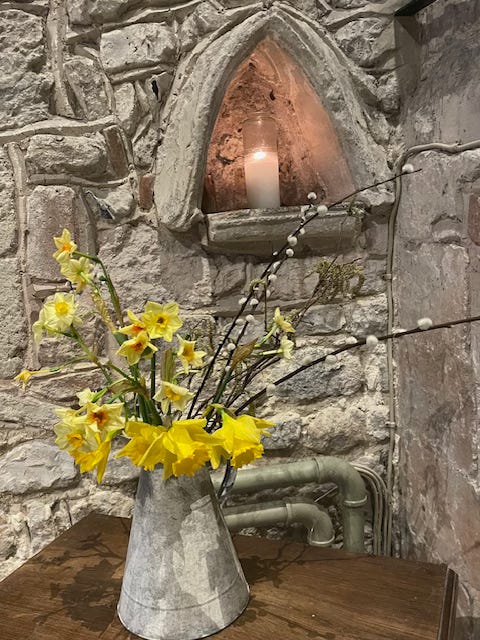
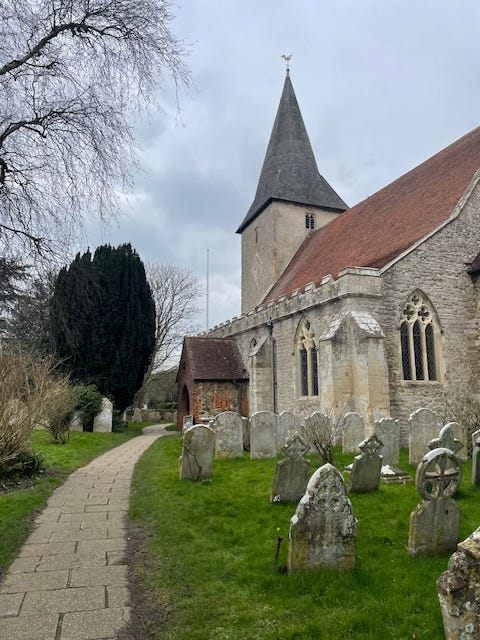
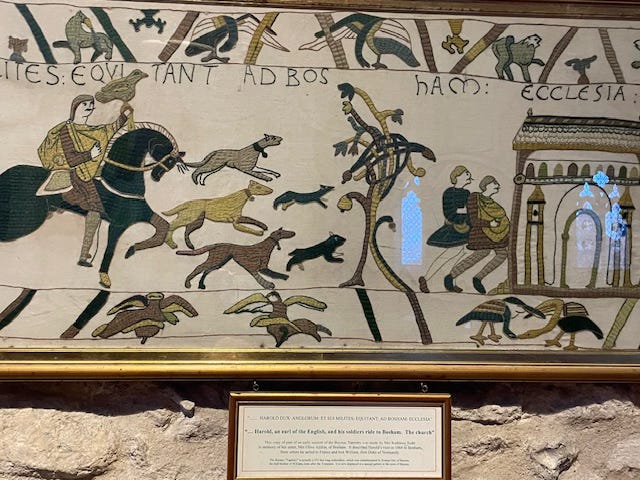
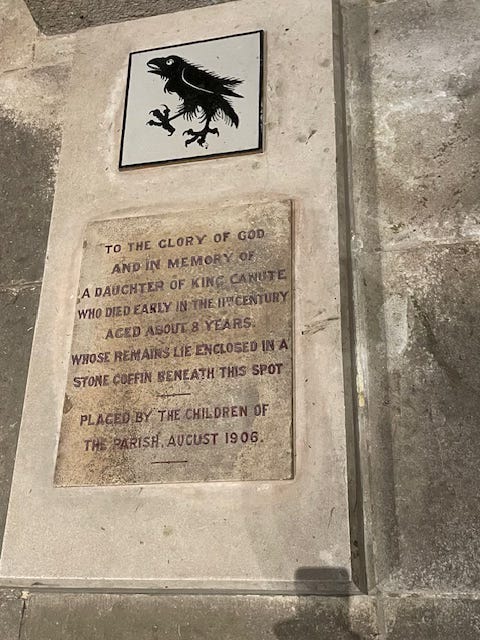

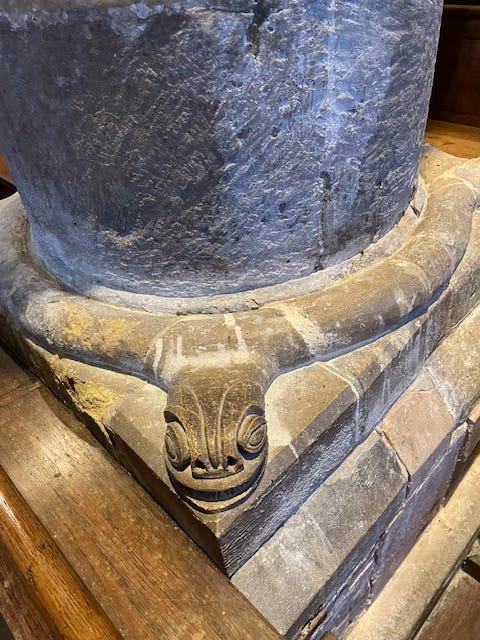

I am up at 3 am suddenly and stumble into this post. The poems are beautiful as is the turtle.
For 15 years, before they both passed away, my parents lived on the beach at Boca Grande, an island off the western coast of Florida.
The Gulf of Mexico is a beautiful sea, soft and welcoming, mostly gentle except for the occasional hurricane.
Sea turtles use the long white sand beaches as the place they are born and return to to lay their eggs.
There are no bright lights allowed at night and it is lights out entirley at moonrise so that the turtles when they hatch do not get confused and head inland to a dry grassy and confusing walk that ends in exhaustion and death.
It is with the natural moon light glimmering off the sea that they make their way to the gulf.
In the early dawn one morning I went down to the the waters’ edge and there they were, dozens of them still trying to make their way. Many more had already mage it. I could see their tracks.
It was very difficult to not help them. But one is not supposed to, for the hard long walk to the waters’ edge is paramount for forging the memory that allows for their return~a hard path for life’s continuance.
The return to the sea is arduous and long. And the helping hand is in fact the one that leaves us to it, to struggle and toil so that the return and the final acceptance into the waters is etched into the soul, such is the making of sea turtles and so too perhaps those of us placed by fate at such a distance for so long. All my life I have struggled to return to England and its green rolling hills. Placed as I was in a desert 4000 miles away to do my first half of life’s work… and now I live somewhere close that I approach my destination. I live just beyond daily reach but close enough to smell the salt water and hear the sound of the waves…so close is Portugal to England compared to Arizona. But still out of reach.
Fierce landscapes forge the soul, and are always personal. A long sea turtle journey home is like making pilgrimage
a way of life, always challenging, always the false light calling the wrong way, always the false hand I would wish to carry me easily to water’s edge.
It was only ever looking up to Orion’s Belt in the sky that gave me my bearings and hope, so to keep the soul’s course until the waves finally reach out and take hold of me themselves, and carry me out to sea.
3:40 am: Porto, Portugal
As a fellow southerner, these words resonated deep inside me - I was born east of Bosham at Rustington and lived in Chichester for ten years - beautiful elegiac haunting songs of place thank you